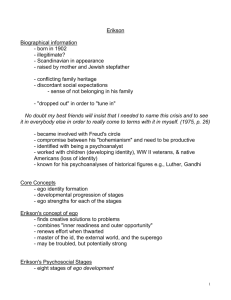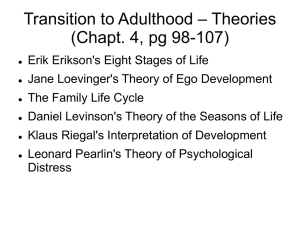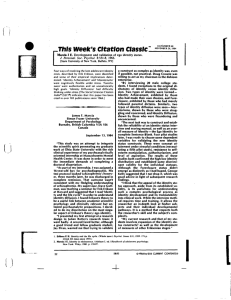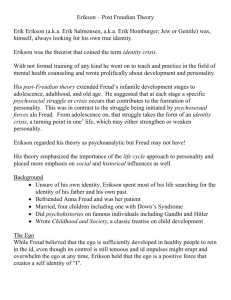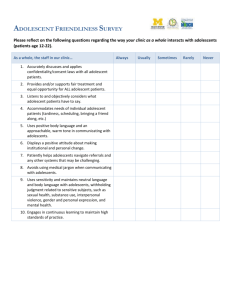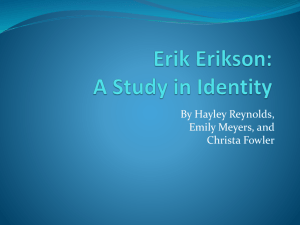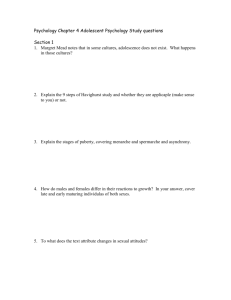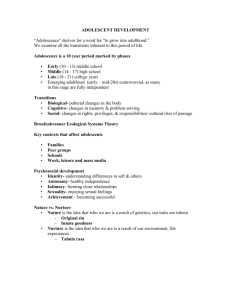Identity Versus Role Diffusion: Who am I
advertisement
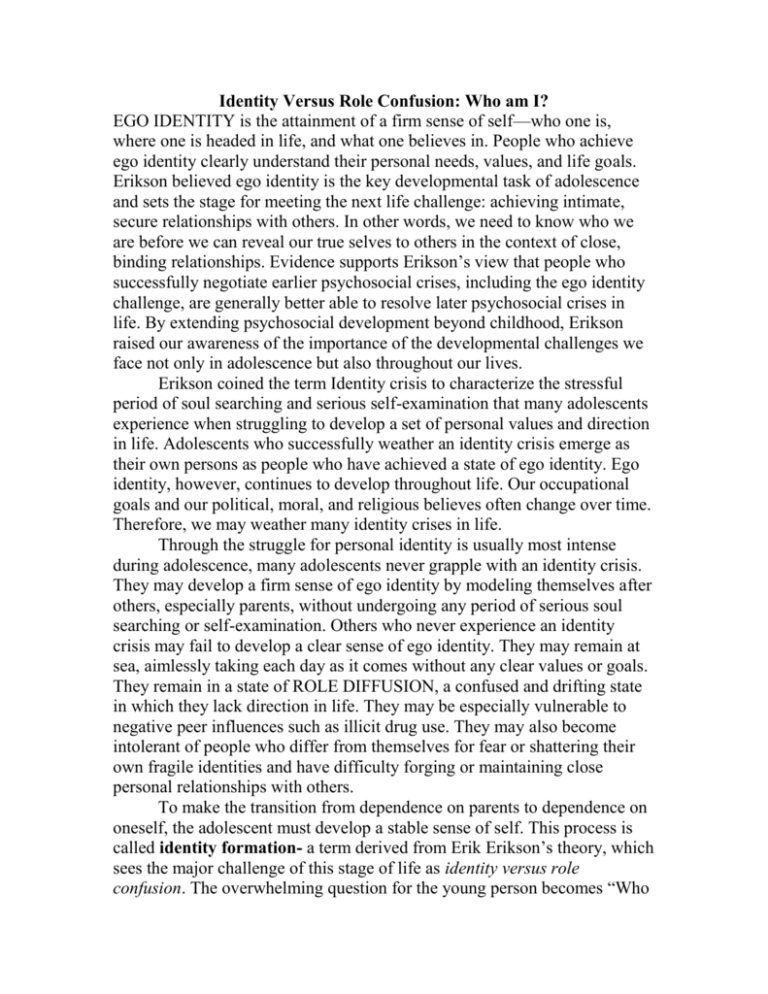
Identity Versus Role Confusion: Who am I? EGO IDENTITY is the attainment of a firm sense of self—who one is, where one is headed in life, and what one believes in. People who achieve ego identity clearly understand their personal needs, values, and life goals. Erikson believed ego identity is the key developmental task of adolescence and sets the stage for meeting the next life challenge: achieving intimate, secure relationships with others. In other words, we need to know who we are before we can reveal our true selves to others in the context of close, binding relationships. Evidence supports Erikson’s view that people who successfully negotiate earlier psychosocial crises, including the ego identity challenge, are generally better able to resolve later psychosocial crises in life. By extending psychosocial development beyond childhood, Erikson raised our awareness of the importance of the developmental challenges we face not only in adolescence but also throughout our lives. Erikson coined the term Identity crisis to characterize the stressful period of soul searching and serious self-examination that many adolescents experience when struggling to develop a set of personal values and direction in life. Adolescents who successfully weather an identity crisis emerge as their own persons as people who have achieved a state of ego identity. Ego identity, however, continues to develop throughout life. Our occupational goals and our political, moral, and religious believes often change over time. Therefore, we may weather many identity crises in life. Through the struggle for personal identity is usually most intense during adolescence, many adolescents never grapple with an identity crisis. They may develop a firm sense of ego identity by modeling themselves after others, especially parents, without undergoing any period of serious soul searching or self-examination. Others who never experience an identity crisis may fail to develop a clear sense of ego identity. They may remain at sea, aimlessly taking each day as it comes without any clear values or goals. They remain in a state of ROLE DIFFUSION, a confused and drifting state in which they lack direction in life. They may be especially vulnerable to negative peer influences such as illicit drug use. They may also become intolerant of people who differ from themselves for fear or shattering their own fragile identities and have difficulty forging or maintaining close personal relationships with others. To make the transition from dependence on parents to dependence on oneself, the adolescent must develop a stable sense of self. This process is called identity formation- a term derived from Erik Erikson’s theory, which sees the major challenge of this stage of life as identity versus role confusion. The overwhelming question for the young person becomes “Who am I?” Erikson sees identity as “the capacity to see oneself as having continuity and sameness.” People need to know that they can trust themselves to behave and feel as they expect to behave and feel in any situation. They need to feel they know themselves. It is equally important that others recognize this consistency. A sense of identity also includes the ability to adapt one’s needs to the opportunities the environment offers. James Marcia believes that finding an identity requires a period of intense self-exploration called identity crisis. The identity crisis involves the decisions necessary to carry out an adult life: What will I do with my life? Whom will I live with? What religious persuasion, if any shall I follow? What will my ideals, values and political beliefs be? These questions involve a separation from parents and other authority figures. He recognizes four possible outcomes of this process. One is identity achievement. Adolescents who have reached this status have passed through the identity crisis and succeeded in making personal choices about their beliefs and goals. They are comfortable which those choices because the choices are their own. In contrast are adolescents who have taken the path of identity foreclosure. They have prematurely settled on an identity that others provided for them. They have become what those others want them to be without ever going through an identity crisis. For example, a student may be majoring in biology because her parents expect her to become a physician. Other adolescents are in moratorium regarding the choice of an identity. They are in the process of actively exploring various role options, but they have not yet committed to any of them. Finally, there are teens experiencing identity diffusion. They avoid considering role options in any conscious way. Many are dissatisfied with this condition, but are unable to start a search to “find themselves.” Some resort to escapist activities such as drug or alcohol abuse. Of course, any given adolescent’s identity status can change over time as the person matures or even regresses. Other Adolescent theories David Elkind used Piaget’s notion of adolescent egocentrism to account for two fallacies of thought he noticed in this age group. The first is the imaginary audience- the tendency of teenagers to feel they are constantly being observed by others, that people are always judging them on their appearance and behavior. This feeling of being perpetually “onstage” may be the source of much self-consciousness, concern about personal appearance, and showing off in adolescence. The other fallacy of adolescent thinking is the personal fableadolescents’ unrealistic sense of their own uniqueness. For instance, a teenager might feel that other couldn’t possibly understand the love they feel toward a boyfriend or girlfriend because that love is so unique and special. This view is related to the feeling of invulnerability we mentioned earlier. Many teenagers believe they are so different from other people that they won’t be touched by the negative things that happen to others. This feeling of invulnerability is consistent with the reckless risk taking among people in this age group.

